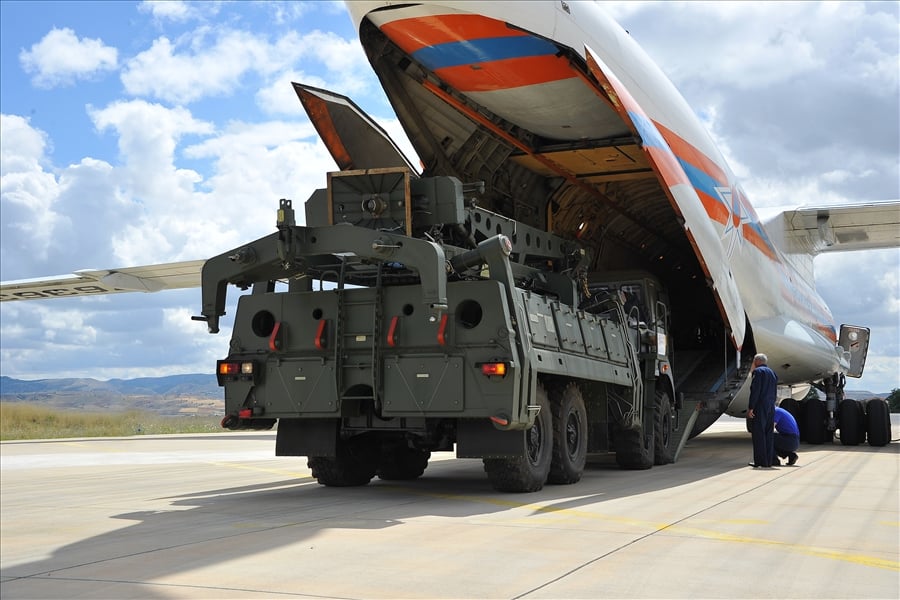Faced with Turkey’s purchase of the Russian S-400 anti-aircraft systems, Israel has already altered its operational patterns while flying over neighboring Syria.
 | ||
| In photos released by the Turkish government, a Russian S-400 is delivered to Turkey Friday. |
The delivery of the Russian made S-400 surface-air missiles by Turkey, will create a “new order” in Middle Eastern airspace, Israeli sources say.
An Israeli expert said that the critical question is, where will the Turks deploy the Russian system. “If it is deployed near the border with Syria it may endanger air forces that will attack Iranian controlled militias in Iraq,” this source says.
The expert added that the Israeli air force and every other air force that may be involved in operations against Iran or its proxies will now have to train to cope with the S-400, widely considered one of the world’s most formidable surface to air weapons.
Israeli experts who talked on condition of anonymity said that the situation will become critical if and when Russian forces leave Syria. “The S-400 operated by Turkey will be capable of following any activity of the IAF over Syria, and that is a totally new situation” one of the experts said.
And the purchase, Israelis noted, creates complex problems for the United States. “Turkey spat today in the U.S face,” one Israeli source said.
A former commander of the Israeli Air Force who asked not to be named, said that the Turkish S-400s create immediate problems for NATO: “Do you think that the Russians will agree to share one of their most advanced technologies with NATO? I’m sure that this is not a possibility.”
/https%3A%2F%2Fsites.breakingmedia.com%2Fuploads%2Fsites%2F3%2F2019%2F07%2FReally-cool-F-35A.jpg) US Air Force F-35A
US Air Force F-35A
Senior US officials have said repeatedly that stationing F-35s in the vicinity of S-400s could compromise one of the plane’s primary capabilities: its radar cross section. That is why the US has pledged to expel Turkey from the F-35 program while working closely with the Erdogan government on all other regional national security issues.
According to Israel’s Institute for National Security Studies (INSS ) there has been growing suspicion in the United States and other NATO countries over the increasing closeness between the two since Russia and Turkey patched over their differences following the shootdown of a Russian jet in November 2015.
According to two INSS senior researchers. Eldad Shavit and Galia Lindenstrauss, Turkish insistence on the deal reinforces the assessment that Erdogan’s moves are a reflection of his intention to change Turkey’s orientation from the West toward closer relations with Russia, or at least Turkey’s choice to take an independent path from the West. “In any case, it is clear that for Russia, the sale of advanced weapons to Turkey reflects its success in inserting a wedge between Ankara and the West, and is a further reinforcement of its success in establishing itself in the region,” they write.
The bottom line is that implementation of the S-400 deal will likely lead to a rift in relations between Turkey and the other NATO allies. In spite of the fears that a reaction will push Turkey even further toward Russia, it appears likely that the Trump Administration and Congress will respond strongly to the move. Word from Washington is that the situation remains unclear. While the National Security Council has apparently approved a sanctions package, no official comments have yet been released by the White House or the Pentagon. At 2 pm local time, it remained unclear whether President Trump had decided to forego sanctions or not.
According to Turkish columnist Burak Bekdil about half of Turkey’s network-based air defense was paid for by NATO, and Turkey is part of NATO’s Air Defense Ground Environment.
In a paper written for the Begin-Sadat Center for Strategic Studies in Israel, Bekdil writes that without NATO’s consent it will be impossible for Ankara to operate any non-NATO system, especially a Russian one.
Relations between Turkey and Israel have been on the down slope since an Israeli commando unit took over a ship that sailed from Turkey carrying activists to Gaza in 2010. Nine activists were killed.